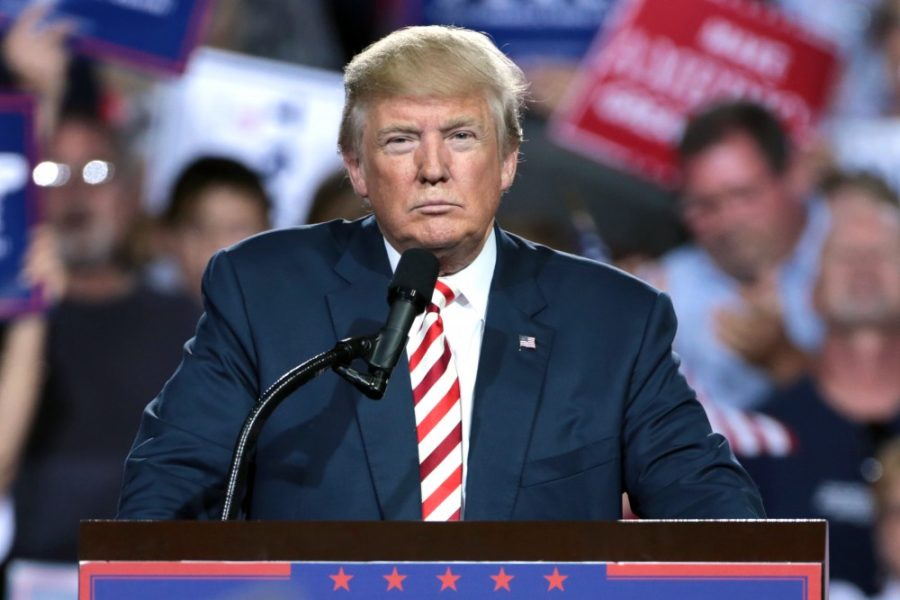Donald Trump does not like NAFTA, and if a deal isn’t made to save the agreement soon, local students will feel the effects while shopping and when looking for work.
During 2016, Trump referred to the North American Free Trade Agreement, the treaty by which Canada, Mexico and the United States can all buy and sell their goods without fear of tariffs or trade barriers, as being the “worst trade deal maybe ever signed anywhere, but certainly ever signed in this country.”
During his first 100 days in office, President Trump threatened to pull out of the agreement unless Canada and Mexico agreed to meet and amend the treaty, and even implied that he would be just as happy tearing the agreement up as he would be amending it.
Even Canadian Prime Minister Justin Trudeau said that he would “walk away” from the negotiations if the United States cannot find a compromise, (4) and a frightened Mexico is beginning to look towards a free trade agreement with Argentina, Brazil and even the European Union if talks fail.
While the three members of NAFTA may be getting cold feet after 24 years of free trade, Arizona certainly is not. Senator Jeff Flake defended the agreement, saying that an America without NAFTA would be an America with “fewer jobs and higher unemployment,” a position very few in the Republican Party are taking now that Trump has spoken against the treaty.
Some of Trump’s complaints about NAFTA make sense; the agreement fails to actively protect and encourage digital and intellectual property rights, and American firms are taking advantage of cheap labor costs and moving jobs south of the border.
However, economists are divided, as jobs in the manufacturing industry have dropped from 17 million in 1994 to only 12.2 million in 2016, and the United States currently buys $55.6 billion more from Mexico than they purchase from us.
On the other hand, Congressional research has actually shown that NAFTA is a net benefit to the U.S. economy, even if only by “a few billion dollars” a year.
Furthermore, when comparing the size of the economy to the trade imbalance, the United States only spends about one percent of its GDP on Mexican goods, while Mexico spends almost 25 percent of its GDP on American goods.
This means that while the United States buys more from Mexico than it sells to it, the Mexican economy is more connected to us than we are to them.
Because the United States imports about $2.7 trillion a year, and total imports from Mexico accounts for only $317 billion dollars, that means that less than nine percent of our imports come from Mexico, which makes the trade imbalance significantly less frightening.
And according to the Office of the United States Trade Representative, the trade between the U.S. and Mexico supplied around 1.2 million jobs in 2015.
Arizona feels the benefits of NAFTA even more than most in the country, as the Chamber of Commerce lists the Grand Canyon state as being the ninth most vulnerable state should the U.S. leave NAFTA.
Our agricultural sector and the sheer mass of shipping between the U.S., Mexico and Canada through Arizona makes us especially vulnerable to any new tariffs or trade rules.
As much as 96 percent of all metals and ores mined in Arizona are exported to either Canada or Mexico, as well as 91 percent of mechanical engines — meaning that if President Trump pulls out of NAFTA, upwards of 203,000 jobs and $10 billion in revenue would be jeopardized by import or export barriers.
Not only are manufacturing and farming affected by the trade with Mexico, as economist Daniel Griswold puts it, “about 25,000 mostly well-paying jobs in Arizona are directly tied to exports to Mexico and Canada, and thousands more jobs in transportation, banking, and finance are indirectly connected,” adding that tourism in the southwest following the signing of NAFTA has led to investments in local companies.
This means higher prices and less work for those living here in Tucson if NAFTA falls apart without a replacement deal.
Students from the University of Arizona would be both directly and indirectly affected by a change in trade with Canada and Mexico, with immediately more expensive cars, fruits and vegetables and even wine and beer.
Because Mexico is our largest supplier of all agricultural goods, even our meals will be more expensive.
Those 203,000 jobs connected to trade with NAFTA partners will be lost, meaning UA graduates will be less likely to find a decent-paying job after graduation in the area. Fields such as mining engineering will be left with graduates looking for employment in a market where success relies on free trade with Mexico and Canada.
Both of our neighbors are our biggest customers, so attempting to put up trade barriers today will hurt us more in the long term, especially considering the Mexican economy is predicted to expand into the seventh largest in the world by 2050.
Renegotiating NAFTA is a necessary and positive thing not only for Arizona, but for the entire United States. Updating the rules that have failed to keep up with a rapidly changing world market allows all three member nations to trade equitably and profitably, but leaving the agreement could cost us billions of dollars a year.
Hundreds of thousands of jobs lost just in Arizona alone, and increased costs of goods and services will be felt by Americans at every level of society if a deal isn’t made. It’s time to commit to a NAFTA that keeps pace with the times.
Alec Scott is a Sophomore Political Science and German Studies Major who volunteered for the Ron Barber 2014 Congressional Campaign. Follow Daily Wildcat on Twitter.









